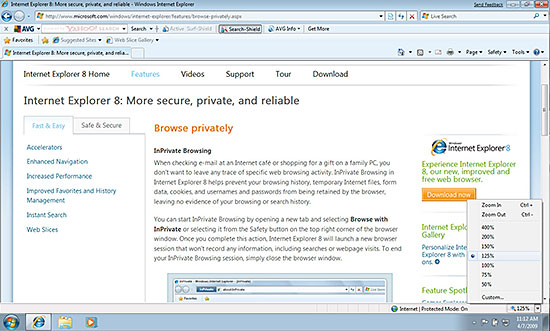Microsoft launches IE8
27/04/09 22:16 Filed in: Technology
Published in the Business Guardian on April 16, 2009.

The launch of Internet Explorer 8 was a low-keyed affair, just three journalists in a meeting room with a projector showing a remotely commanded slideshow and Freddy Arévalo-García, Microsoft Multi-Country Windows Product Manager as a disembodied voice over an Internet connection hosting a simulcast of the launch for journalists here and in Jamaica.
It was probably a good call, since IE8 has been available to the hardiest of the Windows faithful as part of the Windows 7 public beta for at least a month now, and most of the changes to the software are under the hood.
There was a lot of conversation about the "pillars of security," in between the moments when the connection dropped and Marketing & Communications Manager Tricia Ng-A-Mann worked purposefully with nary a hint of embarrassment to get things moving again.
Big items on the agenda for IE8, which Microsoft expects to replace IE7 as the world's dominant web browsing software, were cross-site scripting and SQL Injection, fairly sophisticated schemes that set traps to harvest the personal information of unwary web surfers who pay little attention to the actual web addresses they are visiting.
These techniques, which are either Trojans (software that pretends to do one thing but does something else) or Phishing (social engineering techniques that prey on inattention or ignorance) account for more than 73 percent of known security threats according to a survey by Symantec referred to in the presentation.
I began to lose track of whose heavily accented voice was speaking during the 50 minute linkup, but one comment stood out, "Among process, technology and people, the weakest link is people. People want to trust, people don't like to say no, people like to help."
IE8 now includes security countermeasures that examine links that are known to be suspicious and which have odd constructions before offering warnings to users before they proceed with potentially damaging actions.
Clearly, Internet Explorer 8 offers many benefits to users currently using IE7, but Microsoft has been discovering recently that previous versions of its software are becoming more difficult to unseat with new releases.
Arévalo-García noted that the update to IE8 will be available to Windows users as part of the software's update mechanism, in addition to being available for download from the company's website.
For more information before upgrading, visit Microsoft's website for the product.

The launch of Internet Explorer 8 was a low-keyed affair, just three journalists in a meeting room with a projector showing a remotely commanded slideshow and Freddy Arévalo-García, Microsoft Multi-Country Windows Product Manager as a disembodied voice over an Internet connection hosting a simulcast of the launch for journalists here and in Jamaica.
It was probably a good call, since IE8 has been available to the hardiest of the Windows faithful as part of the Windows 7 public beta for at least a month now, and most of the changes to the software are under the hood.
There was a lot of conversation about the "pillars of security," in between the moments when the connection dropped and Marketing & Communications Manager Tricia Ng-A-Mann worked purposefully with nary a hint of embarrassment to get things moving again.
Big items on the agenda for IE8, which Microsoft expects to replace IE7 as the world's dominant web browsing software, were cross-site scripting and SQL Injection, fairly sophisticated schemes that set traps to harvest the personal information of unwary web surfers who pay little attention to the actual web addresses they are visiting.
These techniques, which are either Trojans (software that pretends to do one thing but does something else) or Phishing (social engineering techniques that prey on inattention or ignorance) account for more than 73 percent of known security threats according to a survey by Symantec referred to in the presentation.
I began to lose track of whose heavily accented voice was speaking during the 50 minute linkup, but one comment stood out, "Among process, technology and people, the weakest link is people. People want to trust, people don't like to say no, people like to help."
IE8 now includes security countermeasures that examine links that are known to be suspicious and which have odd constructions before offering warnings to users before they proceed with potentially damaging actions.
Clearly, Internet Explorer 8 offers many benefits to users currently using IE7, but Microsoft has been discovering recently that previous versions of its software are becoming more difficult to unseat with new releases.
Arévalo-García noted that the update to IE8 will be available to Windows users as part of the software's update mechanism, in addition to being available for download from the company's website.
For more information before upgrading, visit Microsoft's website for the product.
blog comments powered by Disqus